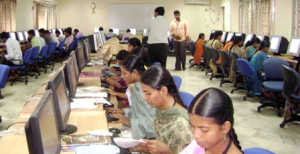From ‘Offline to Online’: COVID-19 Pandemic’s Challenge to Indian Academia
The unforeseen closure of campuses imposed by COVID-19 pandemic has sent entire academia in haste without much time to consider weak technological presence and internet connectivity. The conventional teaching method in the education system has become paralysed. The crisis is enormous and requires significant discussion and policy analysis.
The COVID-19 pandemic has forced Indian academia to opt for unconventional virtual classroom over the face to face routine classroom. This never-used change did not  go well for Indian academics. The over-dependence on internet-based communication network did not go well with teachers, instructors, and faculty members in higher education. Online teaching process became significantly challenging for academic staff in higher education. The university teachers are dealing with issues of excessive administrative responsibilities, online evaluation process and examination of students’ online performances and online harassment through obscene messages and offensive communications. This article looks into some of these issues related to online teaching.
go well for Indian academics. The over-dependence on internet-based communication network did not go well with teachers, instructors, and faculty members in higher education. Online teaching process became significantly challenging for academic staff in higher education. The university teachers are dealing with issues of excessive administrative responsibilities, online evaluation process and examination of students’ online performances and online harassment through obscene messages and offensive communications. This article looks into some of these issues related to online teaching.
Reality of Digital Teaching
Online teaching platforms are highly technological-driven and need an adequate level of familiarity. Many academics face technical glitches due to technologically unfriendly behaviour vis-à-vis lack of managing digital devices for teaching. The faculty members are finding it challenging to manage class-dynamics via an online platform. The inclusive and comprehensive approach of teaching has become challenging for many academicians; primarily in disseminating online lectures to those students who are residing in remote areas. Due to the interrupted internet connections, the regular mode of classes got affected, which has left both students and teachers into chaos and confusion. Moreover, the administrative tasks have become a new set of responsibilities for academic staff during the pandemic.
The tiresome and painstaking work ofmaintaining administrative records of online attendance and classes, the format of lecture series and comprehensive student-evaluation scheme have made academicians’ jobs more complicated and challenging.
Also Read : Online Education during COVID-19: Dividing the Divided
Professional Hardships Due to Digital Education
The purpose of the online platforms is that teaching has to be smooth and communicative and needs to ensure that all students are learning the subject effectively. Online education is a technology-driven strategy which facilitates study resources like articles, pre-recorded videos, YouTube links and digital lectures to the students by teachers. Teaching materials need to be shared with students timely to ensure the effectiveness of communication, which further leads to over-burdening. Academicians are bearing additional pressure of converting all teaching materials to digital formats, drafting worksheets, taking classes on digital platforms like Zoom and Google classroom, checking WhatsApp updates and messages of students and evaluate their academic performances. Due to the strict timeline and lack of direct engagement, the teaching process lead to stress and anxiety among teachers. Academicians do not find digital education feasible due to the lack of experience in operating online platforms such as social media, emails and chats for sharing lectures and notes for the study material. There are a few faculty members, who neither have any prior experience of receiving online assignments nor have experience of preparing online assessment-report, for each student.
Skills and Knowledge Gaps of Academicians
Digital education is still a sophisticated model of education in India.In rural areas, college and university teachers have limited experience in digital education. Due to the lack of digital facilities and hi-speed internet connections, academic staff in the remote rural areas find it very difficult to teach via online mode. Many faculty members, as well as students in remote areas, do not find it comfortable and communicative for the teaching & learning process. Digital teaching affects the student-teacher interactions, detailed discussion on a topic and laboratory experiments to the students. The major drawback of digital teaching is that it lacks the practical and experimental research assignments via online medium mainly in medical studies. Academic staff are skipping experimental research classes, which are not possible without laboratories. Teachers cannot engage in laboratory-based learning from home, which has resulted in a temporary cessation of the practical tests by faculty members.
 Academic staff are also facing pedagogical dilemmas due to online classes. Many faculty members find it difficult to cope up with digital devices, internet connectivity and technological issues. The state-level-academicians have no prior experience of digital teaching processes. Due to the skill and knowledge gap, smooth and regular communication become affected and therefore, digital classes turn ineffective. Such circumstances lead to fear and anxiety of joblessness among contract teachers in the universities. Due to inferiority and scarcity of permanent appointment, many contractual teachers in the higher education sector become anxious about job loss. Under the fierce competition of teaching skills and experiences, the ad-hoc and contractual teachers have been dismissed from their jobs.Therefore, all such issues affect the psychology of the ad-hoc and contractual teachers.
Academic staff are also facing pedagogical dilemmas due to online classes. Many faculty members find it difficult to cope up with digital devices, internet connectivity and technological issues. The state-level-academicians have no prior experience of digital teaching processes. Due to the skill and knowledge gap, smooth and regular communication become affected and therefore, digital classes turn ineffective. Such circumstances lead to fear and anxiety of joblessness among contract teachers in the universities. Due to inferiority and scarcity of permanent appointment, many contractual teachers in the higher education sector become anxious about job loss. Under the fierce competition of teaching skills and experiences, the ad-hoc and contractual teachers have been dismissed from their jobs.Therefore, all such issues affect the psychology of the ad-hoc and contractual teachers.
Cyberbullying and Online Indecency with Academic Staff
Cyberbullying has been a significant issue emanating because of the usage ofthe digital platforms. During the pandemic, the cyberbullying and harassment with female teachers and instructors have increased via the digital teaching process. In the first phase of the pandemic, the online mode became risk-oriented procedure, as it explored the cases of cybercrime such as stealing the data, online abusive and vulgar comments posted for academic staff. Many Delhi University female teachers reported complaints to the college principles against the unknown online attendees for sending offensive and abusive messages.
The harassment of academic staff through online abusive and obscene messages and posts have been reported at the university and college level. Therefore, women’s safety has become the central agenda amidst the pandemic in the media and public debate.
Also Read : Privacy in Digital World: How to Encode it?
Despite all these challenges, digital online is also serving the purpose of regular and continuous education. Technology-enabled education is helping many teachers to continue their coursework uninterruptedly. During the COVID-19 pandemic, digital education is beneficial for the female as well as physically challenged teachers mainly, who lived in remote areas. This article has highlighted the issues and challenges of academics due to the digital process. It is evident that the dynamics of face-to-face classes are different from conducting remote (virtual) classes, but the academic staff have to involve with the teaching process with an enthusiastic and innovative way. Due to the pedagogical changes, the obstacles and problems faced by academic staff because of lockdown and usefulness of online learning mechanism need a critical analysis under the policy framework. All the dimensions arising due to the shift in the educational process needs separate and intense analysis.
A robustpolicy vis-à-vis rapid actions need to be drafted after analysing the readiness of academia, whether the academics are ready to handle online teaching platforms. Firstly, the government should have an orientation programme for teachers’ digital skilling in higher education. Such skill-development programmes will help academic staff to operate digital devices in a more organized, smooth and secure manner. Secondly, there is a need for protection of online data & information in the time of digital education, which may ensure the academicians to share the vital information without any fear and threat. Thirdly, the digital platform should be accessible, secure and dynamic through advanced and innovative methods. Apart from the pandemic situation, the safety of young female students and academicians against cyberbullying need to be taken into consideration by the stakeholders for framing the comprehensive public policy framework.
